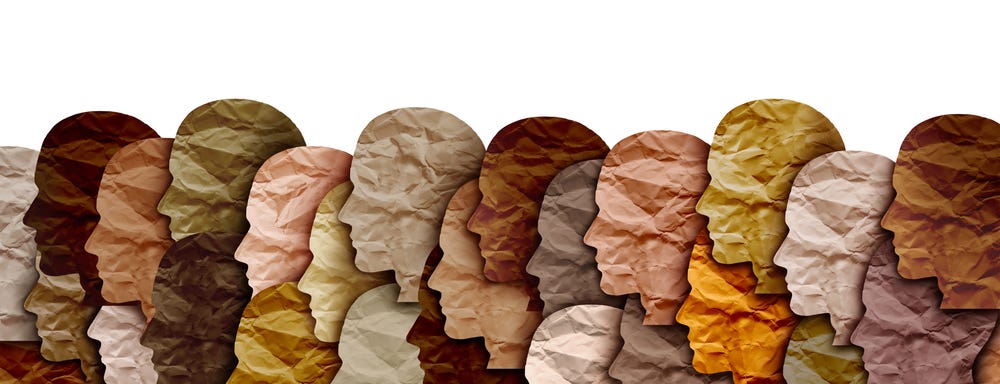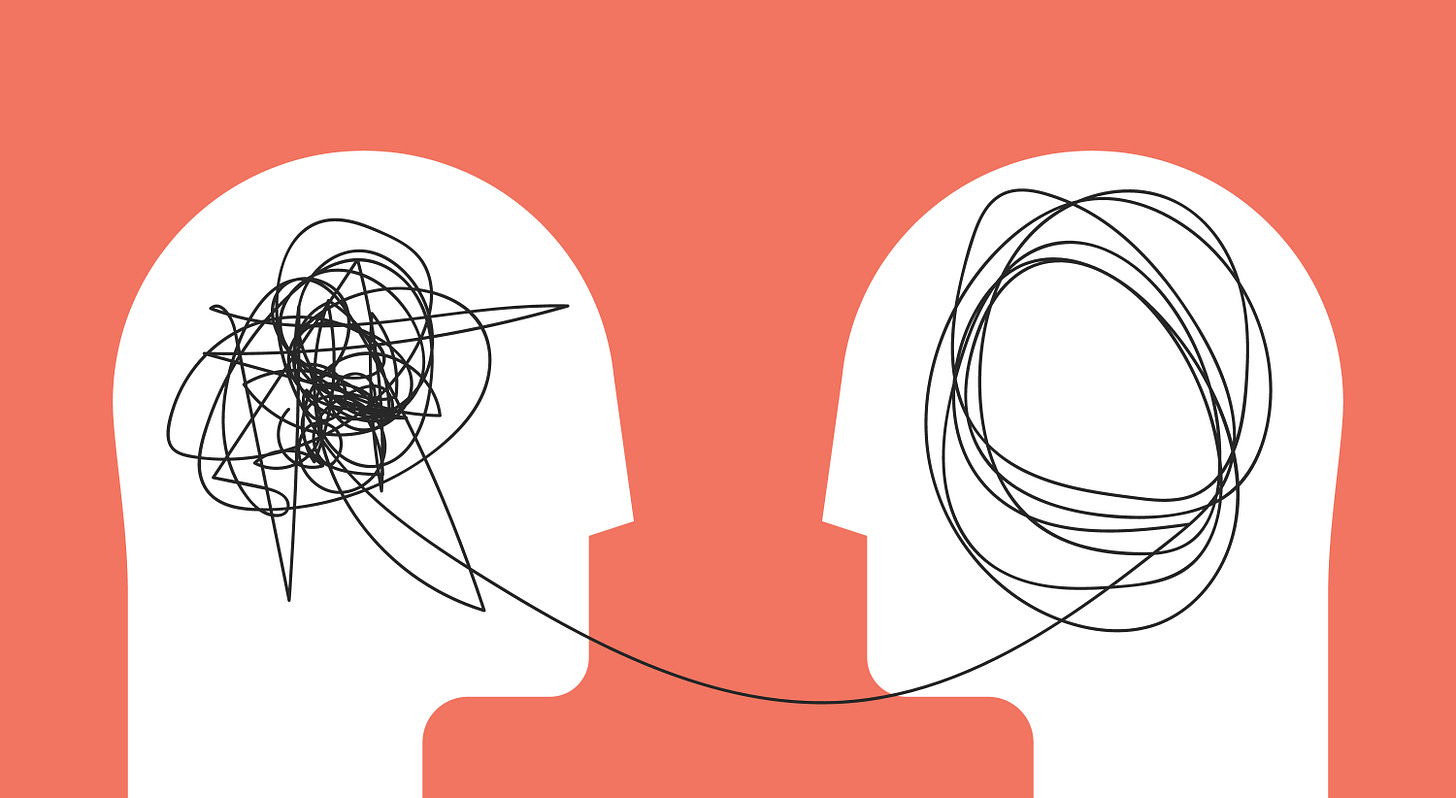E-Pluribus | September 15, 2021
The problem with the ideology of race, groups, and individuals; whatever happened to empathy; and leaving boys behind in the push for gender equity.
A round up of the latest and best writing and musings on the rise of illiberalism in the public discourse:
Glenn Loury: Wrestle Not against Flesh and Blood
On Substack, Brown University professor Glenn Loury addresses some of the issues that an overemphasis on grouping by gender and race can have, unintended though they may be. The effort to break through stereotypes can lead to a new set of stereotypes if the importance of individuals is subjugated to the ostensible characteristics of the group or groups to which individuals belong.
There’s another problem with our current, racially essentialist disparity fixation: You can't fetishize group disparity without implicitly indicting groups that are successful. If you insist on viewing social outcomes in terms of essentialist groups, in terms of racial differences in success, then you've got some losers, some “victims” of the system, who are on the bottom, and you've also got some winners, who are on the top. But what about, say, the Jews? How can you avoid antisemitism, given this way of construing group differences? If you think that blacks and Latinos are underrepresented, how do you avoid the conclusion that Jews are overrepresented? Similarly, how do you address black and Latino underrepresentation in STEM disciplines without seeking to reduce the number of qualified Asians in STEM? Those fractions have to add up to one. You can't have an under-representation without having an over-representation. Are the people who come out on top guilty of “privilege”? Did they “steal” their success? Do they owe their success to the denial of opportunity to someone else? Even if so here or there, is it universally true in every case? Is that a dictum that we have to adhere to? I would submit that this is the wrong way to think about social outcomes. You can see that it’s the wrong way from the places this sort of thinking leads you.
Now, just because I’ve said that we need to get past the ideology of race, this shouldn’t be construed as a denial that racism exists and can have an impact. There's value in asking people to put themselves in another person's shoes. So, if you're a white man in an organization that's mostly white and male, it's not unreasonable to ask you to imagine what it’s like to be a nonwhite or nonmale member—the only black person in the department, or the only woman on the team. How do you think it feels to be judged by the fact of how you look, to have a bundle of stereotypical attributes imputed to you simply because of your skin color, gender, etc.? This is surely what people have in mind when they talk about “privilege.” So, it’s reasonable to encourage white people (and others in majority categories) to be aware of the fact that “whiteness” actually matters in certain circumstances and that nonwhite people in those circumstances may have to bear certain burdens or meet certain unique challenges.
Be this as it may, we often find a troubling emphasis on such notions as “white silence equals violence” or “check your privilege”—ideas that presume a certain black fragility, and which are predicated upon the idea that black people have to be treated with kid gloves in all situations, otherwise offense is given to them, discomfort is imposed upon them, and they are made to feel unwelcome. The new term of art is “inclusion and belonging,” which implies we must ensure people feel that they belong. This infantilization of black people on the supposition that the slightest “off” word, the smallest gesture, might somehow threaten their very sense of wellbeing, is at the root of a lot of current emphasis on white privilege. But why should white people get to be the ones who are presumed resilient and impervious while black people are presumed fragile and vulnerable?
Read it all.
David French: The American Crisis of Selective Empathy
In his Sunday column, David French points to the empathy deficit as one of the exacerbating factors in the cultural and social divide our country is experiencing, and not only that, but the concept of empathy itself is even under assault. While French focuses on the church community’s culpability for this problem, the observations he makes are applicable to society at large as well.
The answer is that America is experiencing an empathy crisis. But it’s not quite the crisis you might think. Our empathy can overflow for the people we love, for the people within our tribe—even when they make grave errors. But what about our empathy for “them,” the people we distrust? Then empathy is in short supply. Indeed, in some cases, the very concept of empathy is under fire.
[…]
[E]mpathy is almost always warped by tribalism and partisanship. I don’t think it’s any coincidence that conversations around the “sin of empathy” have arisen from the more self-described “conservative” quarters of religious America, and the alarms have been raised about empathy in connection with causes that are often perceived as “progressive.”
The instant the tables are turned, however, there is a great call for empathy. Walk a mile in our shoes. White Evangelicals, for example, are disproportionately likely to be anti-mask and anti-vaccine in the midst of a deadly pandemic. “But you have to understand us,” we cry. “There are reasons for these beliefs, and there is great goodness in the church.”
I also see a tremendous hardness of heart in parts of the left as well. I began this essay with the example most likely to trigger rage and contempt from others, even in the face of great suffering. No one can deny the venom spilled out on the dead and dying. Entire lives are remembered only for their final, fatal mistake.
Read the whole thing.
Ari David Blaff: Male Underachievement and the Gender Turf Wars
At Quillette, Ari David Blaff examines the continuing trend in higher education that will soon see two girls in college for every boy who attends. In spite of the trend, the education establishment still tends to focus on the hurdles girls face rather than recognize that we may be overshooting the mark and leaving the boys behind.
The educational advancement of women is strange when viewed alongside the floundering of men. By the end of the 2021 academic year, roughly 60 percent of all college students—a record high—will be women. Estimates from the American Student Government Association now peg female leadership at around 60 percent of all student body presidents and 74 percent of vice presidents. Douglas Belkin recently explored these issues in the Wall Street Journal and found that, of the 1.5 million fewer aspiring students who colleges drew in the past five years, 70 percent of the decline was attributed to men. “[H]igher education’s dirty little secret,” as one consultant called it, is now so bad that certain schools have quietly implemented an “affirmative action for boys” to balance the groaning gender disparity.
* * *
This is an unwelcome development for boys already struggling to tread water alongside resilient girls. Boys, particularly black boys, are disciplined at higher levels than girls. In 2017, a team of researchers led by MIT economist David Autor analyzed a decade of Florida schooling records from 1992 to 2002 which revealed that boys were penalized more frequently. Rather than simply comparing gender disparities in suspensions and school absence, the group analyzed brothers and sisters from identical households and discovered that boys received more suspensions and were absent more often despite hailing from the same social environment. Summarizing the research, Jeff Guo wrote in the Washington Post, “It’s not yet clear why girls are so tough, but they seem much better suited to the challenges of modern childhood.” Indeed, childhood adversity holds long-term negative influences for male development to which women appear to be far less susceptible.
Read it all here.
Around Twitter
Lila Rose reports that Google is banning Live Action’s pro-life ads:
While he’s not accusing Facebook of censorship (yet), Five for Fighting’s John Ondrasik is currently in a dispute with the social media company over promoting a posting of his new song which is highly critical of the Biden administration’s handling of the exit from Afghanistan:
And finally, when is a food award not just a food award? When it’s about social-justice!












